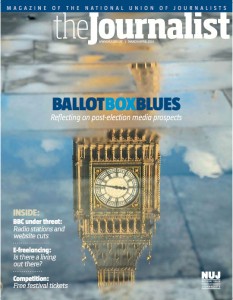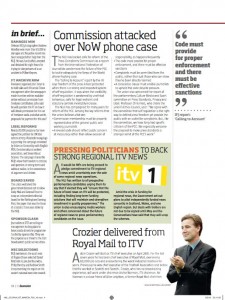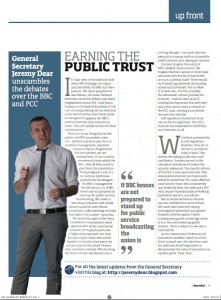One of the points of confusion and controversy in the Press Complaints Commission code for newspapers is that:
ii) A significant inaccuracy, misleading statement or distortion once recognised must be corrected, promptly and with due prominence, and – where appropriate – an apology published.
Furthermore, the editors’ codebook states:
“the positioning of apologies or corrections should generally reflect the seriousness of the error – and that would include front page apologies where appropriate.”
(my emphasis)
This was an issue raised in front of the House of Commons select committee in Feburary last year: that the apologies offered were inadequate for the mistakes made.
Jonathan Coad, head of the litigation group at Swan Turton Solicitors showed the House of Commons Culture, Media and Sport Committee a copy of the Daily Star carrying front page allegations about Peaches Geldof’s sexual behaviour. Following complaints against the article, a correction was made which was 2.6 per cent of the size of the original article and appeared on page two of the newspaper, he said.
“The newspaper agreed – as they could do no other – that the story was inaccurate but what they wouldn’t do was put the correction on the front page,” said Coad. Corrections favour newspaper groups rather than a complainant or the general public, he added. The PCC is in “favour of those who set it up in the first place,” he said.
But the PCC maintains that a system is in place. When I interviewed the director of the PCC, Stephen Abell in February this year, he said that the length and terms of adjudications already change:
[The PCC] can control how much the newspaper has to print by the length of its own adjudication. I think the process is already in place.
(Update: In the comments below, the PCC emphasises this comment was made in regards to ‘adjudications’ not specifically ‘apologies’)
When the select committee published its recommendations last month it said: “The interpretation of the Code’s requirement for an apology to be printed with ‘due prominence’ remains a matter of controversy”.
In oral evidence to us, the then Minister Barbara Follett acknowledged that the placing of apologies was a problem: “From my own personal experience, the offence can be on page two in large type and the apology basically somewhere around the ads in very small type, and that is something which I would like to see changed.”
The committee recommended:
The printing of corrections and apologies should be consistent and needs to reflect the prominence of the first reference to the original article. Corrections and apologies should be printed on either an earlier, or the same, page as that first reference, although they need not be the same size. Newspapers should notify the PCC in advance of the proposed location and size of a correction or apology; if the PCC indicates that the requirement for ‘due prominence’ has not been fulfilled and the paper takes no remedial action, then this non-compliance should be noted as part of the published text of the correction or apology. We recommend that this should be written into clause one of the PCC Code.
So, under the guidance of the select committee, we could see a strengthened apology and correction system come into play (the PCC is considering its recommendations at the next meeting of the Commission).
Could this mean more front page apologies in the UK? We might look to the US for encouragement.
Tabloid Watch and Regret the Error recently noted that Indiana’s Star Press newspaper went the extra mile with a detailed apology on its front page, correcting a mistake about Ball State athletic director Tom Collins and his employment intentions. I contacted its author, sports editor Greg Fallon, to find out why the decision had been taken.
“We felt that a typical correction buried inside the newspaper or a story on the sports front would not sufficiently set the record straight,” Fallon said.
“Beyond that, I’ll just say that we were not only sorry to Tom Collins for the error and wanted to correct it, but we also owed an explanation to our readers on how, exactly, the error happened.
“That transparency, we feel, strengthens the relationship between reader and newspaper. In the end, we were able to explain it all best in a column.”
Wow. I’m with Tabloid Watch on this one: “It’s almost impossible to imagine a British newspaper – particularly a national – writing something such as this on their front page. And yet, why shouldn’t they?”
But what a cultural shift we’d need to see this happen. Newspapers might not be holding the front page quite yet, but they should take heed from the Geldof vs Daily Star case.
As the Guardian reported in January 2010, Geldof, represented by Jonathan Coad, was unsatisfied with the PCC ruling and 2.6 per cent apology on page 2 and took the matter to court. The Daily Star was forced to pay (undisclosed) substantial damages and legal costs:
“The defendant refused to publish a retraction and apology on its front page but instead published it on page two,” said Coad.
“As the publication was substantially smaller, the claimant considered this to be unacceptable as it was not, in her view, adequately prominent.
“The Press Complaints Commission adjudicated upon the prominence and found it to be proportionate.
“It is for this reason that the claimant now wishes to make this statement in open court to make the falsity of this allegation a matter of public record.”



